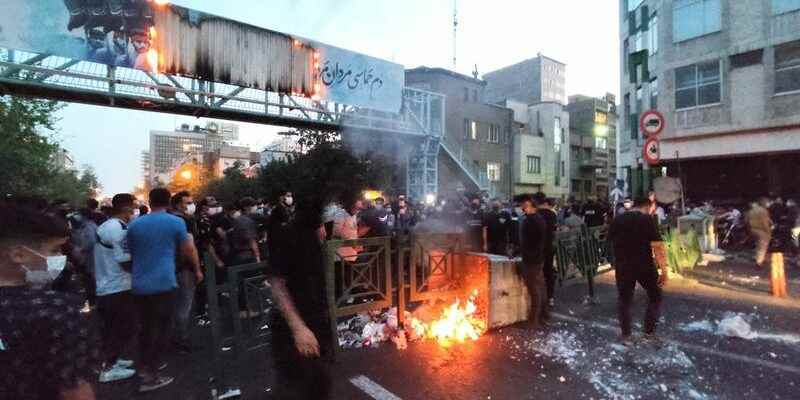DUBAI (Reuters) – Iran’s president said on Thursday that “acts causing chaos” were unacceptable, as protests following the death in custody last week of Mahsa Amini, a young woman arrested for wearing “inappropriate” clothing “, continue.
Ebrahim Raisi, speaking at a press conference on the sidelines of the 77th UN General Assembly, added that he had ordered an investigation into the circumstances of Mahsa Amini’s death.
“Freedom of expression exists in Iran…but acts causing chaos are unacceptable,” the Iranian leader said.
The Revolutionary Guards on Thursday called on the Iranian courts to prosecute “those who spread false information and rumours.
By issuing this warning, the elite corps of the Iranian army sends the message that it is ready to suppress the demonstrations more severely to protect the Islamic regime.
The anger has not subsided since the death of Mahsa Amini, who fell into a coma while being detained with other women by the morality police. Her father said his daughter had no health problems, contrary to claims by Iranian police, who deny ill-treating her.
The Revolutionary Guards expressed in a press release their solidarity with the family of Mahsa Amini, while warning those who would seek, according to them, to take advantage of the situation to destabilize Iran.
“We have asked the judiciary to identify those who spread false information and rumors on social networks and on the streets (…) and to deal with them firmly,” the statement said.
The Iranian president deplored the international media coverage given to the death of Mahsa Amini.
“Every day, in many countries, including the United States, men and women die in clashes with law enforcement, but few people care about the reasons behind the violence and the response brought in,” he said.
Judiciary chief Gholam-Hossein Mohseni Ejei called for swift action to “maintain peace and security for citizens”, the semi-official Tasnim news agency reported.
Iran has not experienced such an unprecedented wave of protest since the demonstrations of 2019, when part of the population took to the streets to protest against the increase in fuel prices. According to Reuters, the repression had then killed around 1,500 people.
Initially limited to the north of the country, where a large Kurdish population lives, the September movement has spread to other parts of the country and now concerns at least fifty cities, including the capital, Tehran.
Police stations and law enforcement vehicles were set on fire earlier in the day in several Iranian cities, including Tehran, during protests.
In Mashhad, in the northeast, a member of the Bassij, an Iranian paramilitary force under the authority of Ayatollah Ali Khamenei, was stabbed to death, according to reports from Tasnim and Fars.
According to Tasnim, another bassidji was killed on Wednesday in Qazvin by firearms by “rioters and criminals”, bringing to four the total number of members of the security forces killed since the start of the dispute.
INTERNET DISRUPT
In a video posted by a Twitter account specializing in monitoring protests in Iran, the authenticity of which Reuters could not confirm, a crowd of demonstrators gathered in a northeastern city chanted: “We will die, we will die, but we will find Iran”.
According to the Kurdish human rights organization Hengaw, the human toll in the area of Iranian Kurdistan stands at 12 dead. The security forces deny having killed any of them and put these deaths on the account of armed dissidents.
Failing to see the movement subside, the authorities decided to restrict internet access in the hope of limiting the spread of the demonstrations, say Hengaw, which NetBlocks, a site specializing in monitoring internet shutdowns, seems to confirm .
In Tehran, a police station was set on fire, a sign of the spread of the protest movement to other parts of the country.
Supreme Leader of the Islamic Revolution Ali Khamenei made no reference to the protests on Wednesday during a speech commemorating the Iran-Iraq War (1980-88) but Iranian officials and clergy fear an escalation in protests and riots.
Ali Khamenei himself is targeted in the slogans chanted by the demonstrators who promise that his son Mojtaba, presented as a favorite to succeed him, will die before in turn becoming the supreme guide.
(Dubai office; French version Nicolas Delame and Camille Raynaud, editing by Sophie Louet and Tangi Salaün)
